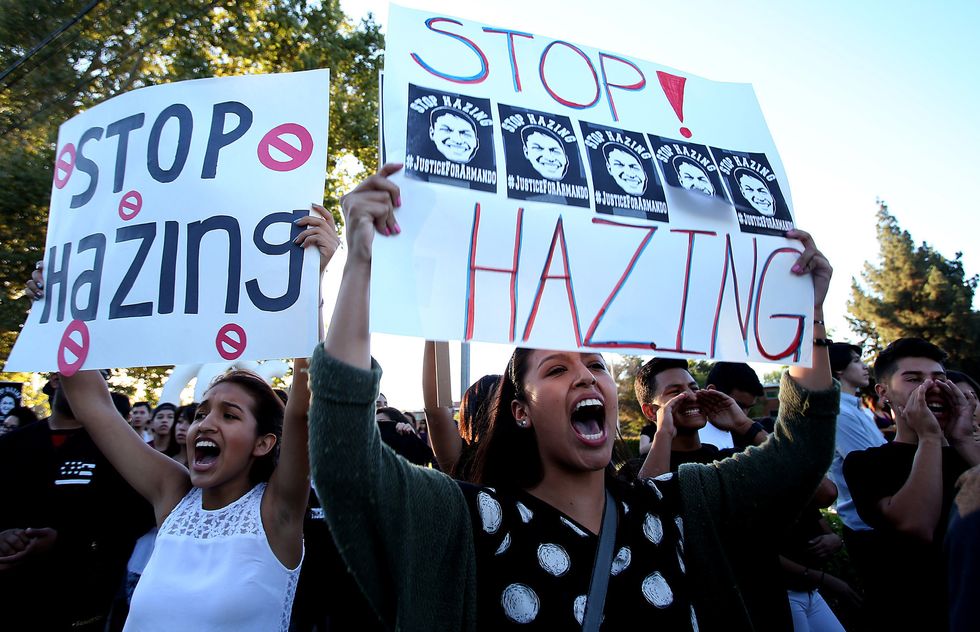Penn State University's main campus in State College, PA is under fire after the death of a student perpetuated by members of now campus-banned fraternity Beta Theta Pi.
In lieu of recent tragedy at Penn State University this month, it is time for institutions of higher education and Greek organizations nationwide to ask this question: is it really worth it?
Timothy Piazza, a 19-year old sophomore studying engineering at PSU was in the process of pledging fraternity Beta Theta Pi when, at a mandatory "rite of passage" (hazing), he suffered extreme head trauma under forced intoxication in the presence of other brothers (bystanders). Once authorities were contacted at 10:48 a.m. the next morning upon "concern" ("actions have consequences?") of his condition, it was tragically much too late: at the most critical moment, neglect of "fraternal responsibilities" (as well as human responsibilities) and hazing rituals led to the saddening passing of Timothy. So far, eight members of Beta Theta Pi have been charged with involuntary manslaughter, with an additional ten facing lesser charges, total to more than 600 charges.
SEE ALSO: What Happened To Tim Piazza Could Have Happened To Anyone
As his father, Jim Piazza put it: "This didn't have to happen. This is the result of a feeling of entitlement, flagrant disobedience of the law and disregard for moral values, that was then exacerbated by egregious acts of self-preservation. Again, this did not have to happen. No parent should have to deal with this." His father echoes the sentiments that parents fear most when their children are thrust with the responsibilities and priorities of "legal adulthood" when quite honestly, our young adult brains aren't even finished maturing yet. And frankly, this undeserved sense of entitlement is not uncommon and often surrounds the social hierarchy of Greek life.
Outrage among students in reaction to the death of a student pledging Beta Theta Pi at Penn State made its mark on campus walls.
Being that all Greek organizations have somewhat of an organizational hierarchy of authority/power, it is easy for that hierarchy to make illogical "demands" to its inferiors in pursuit of the group's so-called values (ex. "taking one for the team", whether that be in popular hazing/drinking game Don't Fuck Your Brother or not being allowed to sleep where you live to show your utmost devotion for the group).
These behaviors get continually reinforced through "generations" (coming and going pledge classes) and create an endless cycle in which the authority figures typically want to expel the same pain/humiliation/trauma they experienced onto their own "inferiors."
In my opinion, this seems to be one of the trickier aspects of hazing, because then breaking that cycle can be seen as "breaking tradition" (ex. how dare you refuse to brand that freshman with a hot iron, it's on all of us). But really? It's so important to avoid "breaking tradition" for the sake of a set of moral values you prize yourself on, even when you blatantly disrespect those values by endangering and potentially harming another individual? Please enlighten me on how this widespread irony reflects your good character and your sound values! Most saddening of all is to think that a situation like this (many situations like these) could have been prevented; whether it could have been a sooner call for help or simply defying the threshold of "peer pressure" when someone's life is at stake for the sake of an organization that cries "brotherhood" (anybody see the irony?).
The high frequency and often recurrence of these events continues to normalize behaviors that degrade and hurt others with the end goal of "recruiting the perfect member", who in turn will in the future dispel ritual harm on his/her own predecessors. In fact, here's a dandy little timeline Bloomberg began in 2015 to catalog fraternity/sorority misconduct, coinciding with similar headlines Penn State made at the time (and many others).
This comes at a time when American collegiate history seemingly progresses, however the normalization of "low-key hazing" (whatever that means) is still maintained in many fraternal organizations and desensitizes the public from even being remotely shocked (boys will be boys, right?). And honestly, as a University of Miami student, I can't even say that I feel surprised when I see these headlines because they are all part of a bigger socio-behavioral issue that plagues most of Greek life in US colleges and universities, including my own. With that in mind, let's quit downplaying the gravity of hazing and get down to business:
We need to view hazing incidents on college campuses as less of sensationalist headlines and more as a public health issue.
There needs to establish a nationwide initiative that seeks to educate students on the gravity of hazing policies and foster the ability to recognize potentially dangerous situations or oppressive uses of power to punish others. Although "hazing" is officially outlawed in 44 states, every year there are students who participate in Greek-related activities who are humiliated, assaulted, or even die at the hands of fraternal hazing practices and an assumed carelessness.
At the University of Miami, our President Julio Frenk takes very progressive approaches to all social issues, however I cannot be blind to what goes on in Greek life here as a large component of campus social life, and unfortunately, I've seen a great deal of the behaviors I discuss in this article, through friends and acquaintances. Hazing is no joke, and when you're wearing the vulnerability of wanting to be accepted into a social group, it is easy to let that desire cloud your judgement and in turn negate your self-respect and well-being; on the other side, it predisposes but does not justify your superiors to use and abuse you because "group values" are at stake or need to be achieved. What needs to be understood is that as these groups use destructive behavior on their prospective members disguised as "rituals" to "maintain tradition and values", they are really furthering a cycle that in turn does not advance the social integrity of one's letters. With all this in mind, it's time to declare a state of emergency on Greek Life communities and take a revolutionary stance against hazing policies, for the good of all university students.
As Centre County District Attorney Stacy Parks Miller said about the recent Penn State trial, "There is just nothing about this case that isn’t heartbreaking. Kids don't go to college to die".
#CanesCareForCanes
My thoughts, heart and soul are with the Piazza family, as well as every family who has lost a child due to hazing practices.




















